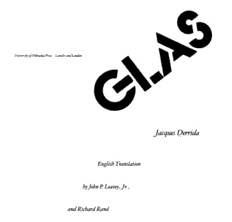
Glas PDF
265 Pages·1986·17.269 MB·English
Most books are stored in the elastic cloud where traffic is expensive. For this reason, we have a limit on daily download.
Preview Glas
Description:
Jacques Derrida is probably the most famous European philosopher alive today. The University of Nebraska Press makes available for the first English translation of his most important work to date, Glas. Its appearance will assist Derrida's readers pro and con in coming to terms with a complex and controversial book. Glas extensively reworks the problems of reading and writing in philosophy and literature; questions the possibility of linear reading and its consequent notions of theme, author, narrative, and discursive demonstration; and ingeniously disrupts the positions of reader and writer in the text.Glas is extraordinary in many ways, most obviously in its typography. Arranged in two columns, with inserted sections within these, the book simultaneously discusses Hegel’s philosophy and Jean Genet’s fiction, and shows how two such seemingly distinct kinds of criticism can reflect and influence one another. The customary segregation of philosophy, rhetoric, psychoanalysis, linguistics, history, and poetics is systematically subverted. In design and content, the books calls into question “types” of literature (history, philosophy, literary criticism), the ownership of ideas and styles, the glorification of literary heroes, and the limits of literary representation.
See more
The list of books you might like
Most books are stored in the elastic cloud where traffic is expensive. For this reason, we have a limit on daily download.
